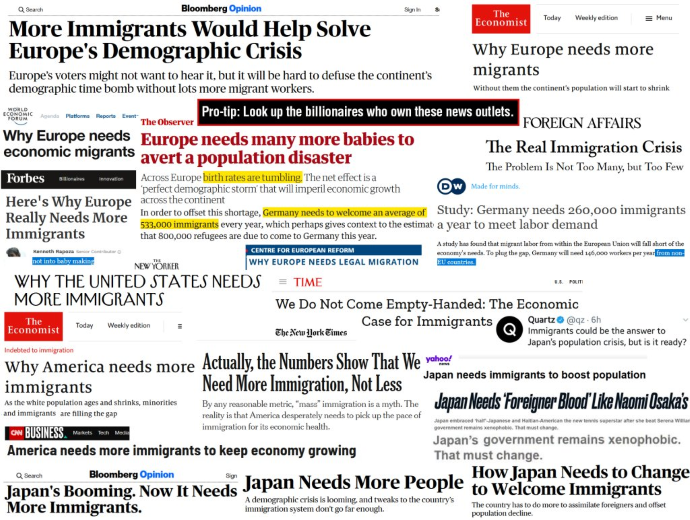Incredible Immigration Propaganda Lunacy
Take a look at this collection of unbelievable immigration propaganda. What lunacy!
Popular Economic Fallacies Regarding Immigration, by By Ezra Mishan, The Social Contract, Summer 2005:
... It may be concluded that importing foreign labor to meet a perceived labor shortage - obviously the preferred solution of businessmen - acts to prevent the rise in pay necessary to eliminate the initial shortage of domestic labor. It should also be apparent, however, that such a rise in the pay of, say, nursing and transport personnel does not alter the aggregate real income of the economy since it involves no more than a transfer payment from one group to another in effect a redistribution of real income in favor of workers in nursing and transport....
From this unremarkable observation no benefits from increased immigration can be salvaged, at least, not in a world where the ranking of countries by population has no affinity whatever with their ranking by economic development or economic innovation....
The prevention of a rising tide of illegal immigrants from gradually swamping the precarious civilizations of the West will soon become the most urgent of political priorities. With the gathering momentum of the South to North movement - further energized by increasingly profitable and powerful criminal organizations... We should be thinking more realistically of our prospects for survival as a nation in an already tight little island set in a world of expanding population and mobility, and if not as a nation, at least as a haven of relative civility and security in a "global village" become increasingly grasping, frenzied and savage.
The late Dr. Ezra J. (E.J.) Mishan of the London School of Economics was a real pioneer and rebel in the economics field, shunned as a heretic because he challenged the reigning ethos and dogma of "neoclassical [mainstream capitalist] economics" that perpetual economic and population growth are possible on a finite planet because of infinite human ingenuity and endless innovation.
Mishan's 1967 book The Costs of Economic Growth was especially influential in laying the intellectual foundation for the emergence of environmental economics and ecological economics, the latter representing a more radical critique of neoliberal business-as-usual prop-growth policies (such as unlimited immigration) than the former.

